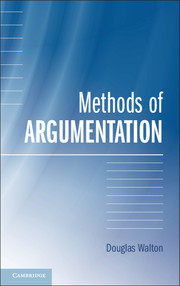Book contents
- Frontmatter
- Contents
- Acknowledgments
- 1 Introducing Some Basic Concepts and Tools
- 2 Argument Attack, Rebuttal, Refutation and Defeat
- 3 Arguments with Missing Parts
- 4 Applying Argumentation Schemes
- 5 Similarity, Precedent and Argument from Analogy
- 6 Teleological Argumentation to and from Motives
- 7 The Carneades Model of Scientific Discovery and Inquiry
- 8 Fallacies, Heuristics and Sophistical Tactics
- 9 The Straw Man Fallacy
- Bibliography
- Index
6 - Teleological Argumentation to and from Motives
Published online by Cambridge University Press: 05 June 2014
- Frontmatter
- Contents
- Acknowledgments
- 1 Introducing Some Basic Concepts and Tools
- 2 Argument Attack, Rebuttal, Refutation and Defeat
- 3 Arguments with Missing Parts
- 4 Applying Argumentation Schemes
- 5 Similarity, Precedent and Argument from Analogy
- 6 Teleological Argumentation to and from Motives
- 7 The Carneades Model of Scientific Discovery and Inquiry
- 8 Fallacies, Heuristics and Sophistical Tactics
- 9 The Straw Man Fallacy
- Bibliography
- Index
Summary
As shown in Chapter 1 Section 2, there are two apparently opposed models of rational thinking and acting in the literature on cognitive science. The belief-desire-intention (BDI) model is based on the concept of an agent that carries out practical reasoning premised on goals that represent the agent’s intentions and incoming perceptions that update the agent’s set of beliefs. The commitment model is based on agents interacting with each other in a dialogue in which each contributes speech acts. Commitment in dialogue is a public notion because evidence of commitment is available in the commitment set (database) of propositions that an agent has gone on record as accepting (Hamblin, 1970; 1971). Explicit commitments are statements externally accepted by an agent and recorded in an external memory that is transparent to all parties. Implicit commitments, of the kind that need to be postulated to reconstruct arguments as enthymemes, can be inferred from the explicit ones using argumentation schemes and dialogue rules, as indicated in Chapter 3. However, beliefs, desires and intentions are private psychological notions internal to an agent, and so there is a logical problem of how we are to infer what they are. One agent cannot directly inspect the contents of another agent’s mind as a basis for making this judgment. This inability poses an evidential problem for the BDI model.
The problem of other minds has long been a central difficulty in philosophy, not only in philosophy of law, but also in ethics and philosophy of mind. We can observe a person’s external actions, and thereby have empirical evidence to confirm or refute the claim that this person carried out a particular action. But since we cannot directly observe a person’s motive, intention or desire, how can we confirm or refute any claim that a person acted on the basis of such an internal state of mind? The problem is particularly acute in legal reasoning about evidence in criminal law, because so much of it is built on assumptions about mens rea, the guilty mind. This chapter surveys recent developments in argumentation-based artificial intelligence and law to address the problem by studying the logical structure of reasoning about motives in law.
- Type
- Chapter
- Information
- Methods of Argumentation , pp. 154 - 180Publisher: Cambridge University PressPrint publication year: 2013



